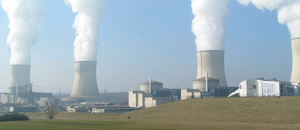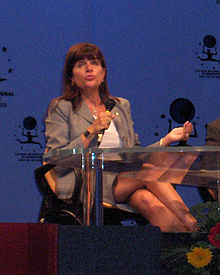 I really dislike nuclear power. In fact, I think we shouldn't do it. But usually, when people criticize nuclear power they point to two issues: safety and waste disposal. My objection is related to those topics, but I'd like to describe it in more fundamental terms. I object to nuclear power because it's a critically incomplete idea.
I really dislike nuclear power. In fact, I think we shouldn't do it. But usually, when people criticize nuclear power they point to two issues: safety and waste disposal. My objection is related to those topics, but I'd like to describe it in more fundamental terms. I object to nuclear power because it's a critically incomplete idea.Operating a nuclear power plant generates nuclear waste. However, as I wrote in 2008, we don't have a good plan for how to dispose of nuclear waste (and 3 years later, we still don't). Seriously, we're producing highly toxic waste that's going to be around for thousands of years... and our best plan is to put it in "long term storage." This is as foolish as taking off in an airplane with the expectation that we'll figure out how to land it someday. I suppose that's alright if you're a test pilot, but not so much if you're doing it with a fleet jetliners, each full of passengers, flying over major cities.
You might wonder, "How close are we to having a disposal plan?" Well, Newsweek recently did an article about a nuclear power advocate from France, named Anne Lauvergeon. In the article, she pointed out that "the technology exists to destroy it [nuclear waste] in a laboratory setting—a technology she predicts will jump to real life within 20 years."
Um, really? If the technology we're depending on won't be ready for real world use until 2030, shouldn't that give us pause? Isn't there a chance our prediction of what life will be like in 20 years could -just maybe - be a little bit off? Sure, go ahead and produce 20 years worth of nuclear waste. I'm sure we'll figure out what to do about it someday...
The same thing applies to all sorts of other designs. For example, the latest GAO report on selected weapon systems pointed out that the Joint Strike Fighter went into production even though three critical technologies are not mature, the manufacturing process isn't proven yet and the testing is incomplete. Yeah, you guys go on ahead. Don't worry - the technology, manufacturing and testing crew will just catch up later.
I promise you, that approach is not on anyone's list of Best Practices.
OK, back to nuclear power. What are we doing with all that spent fuel while we're waiting 20 years for the big breakthrough? Mostly, we're keeping it on site, in some cases storing five times more waste than the container was designed to handle. And of course we're continuing to produce even more waste... without a good plan on what to do with it all.
 On the question of safety, Ms. Lauvergeon's aforementioned interview listed a series of catastrophic scenarios and explained that thanks to our robust designs, "Whatever happens, you will have no leak in the air or the ground.” This was about a week before the earthquake hit Japan. Oopsie!
On the question of safety, Ms. Lauvergeon's aforementioned interview listed a series of catastrophic scenarios and explained that thanks to our robust designs, "Whatever happens, you will have no leak in the air or the ground.” This was about a week before the earthquake hit Japan. Oopsie!Yes, most nuclear power plants operate with perfect safety records. But when one fails, it fails hard. We can't prevent it 100% of the time, and we don't really know how to deal with it when the inevitable failures occur. Just one more example of how this is not a complete idea.
Also, Ms. Lauvergeon should find a new job.
I'm all for exploration and experimentation. I'm a lab guy at heart. But when the objective is to develop an operational system, one that'll be built in large quantities and used in the real world, where failure has serious consequences on a major scale, we must make sure we have a complete idea, to include things like safety & disposal. Until then, it's best to use other solutions that are already proven and complete.
10 comments:
I not an expert on nuclear power, but my understanding is that if we reprocessed our nuclear waste we would render 95+% of the "waste" to inert, safe material, and the remaining 5-% would go back into the reactors as new fuel.
We don't do this out of some obscure concern for the safety of the material. Again, I simply don't know enough about the issues. Clearly our current approach is wrong. To your point, we need to be experimenting, small scale, to solve these problems before we can move forward.
Just a precision about Ms Lauvergeon because in France we know her very well, she's CEO of THE major company in charge of nuclear power (Areva). The funny thing that you probably ignore is that before Japan's disaster she was highly criticized for being too much focused on security, while many other deciders were considering we were doing too much about nuclear security. France lost some sales in the middle east. Korean won the sales because they were cheaper. This is why some people started to criticize the over-security approach of Ms Lauvergeon. And the fact is the Japan's disaster has not weakened but strengthened her postion.
Blogger had some problems and we seem to have lost the comments - darn! They were good comments and I'm hopeful the nice people at Blogger will put them back.
If they don't show up automatically soon, I'll see if I can do something to bring them back... I just didn't want to give the impression that I deleted them myself for any reason.
Yeah, but isn't 70>0?
;)
Reposting Andy Wagner's comment:
I not an expert on nuclear power, but my understanding is that if we reprocessed our nuclear waste we would render 95+% of the "waste" to inert, safe material, and the remaining 5-% would go back into the reactors as new fuel.
We don't do this out of some obscure concern for the safety of the material. Again, I simply don't know enough about the issues. Clearly our current approach is wrong. To your point, we need to be experimenting, small scale, to solve these problems before we can move forward.
Reposting Domino Dev's comment:
Just a precision about Ms Lauvergeon because in France we know her very well, she's CEO of THE major company in charge of nuclear power (Areva). The funny thing that you probably ignore is that before Japan's disaster she was highly criticized for being too much focused on security, while many other deciders were considering we were doing too much about nuclear security. France lost some sales in the middle east. Korean won the sales because they were cheaper. This is why some people started to criticize the over-security approach of Ms Lauvergeon. And the fact is the Japan's disaster has not weakened but strengthened her postion
@Andy - You're right that there are ways to reprocess nuclear waste, but as you pointed out there's the big IF in "if we reprocessed..." and there are still safety concerns. It boggles my mind that we would proceed so far down the line with so many unresolved issues.
@Domino - Thanks for the clarification & info. I'm glad to hear Ms L. was focused on security, but I'm afraid my criticism still stands: she said there'd be no leaks "no matter what happens." A week later, something big happened and there were leaks. If her position really is that we aren't taking appropriate safety measures, then I'm not sure why she would simultaneously advocate building MORE nuclear plants. And the question of waste disposal is still unresolved.
@Mark - Ah, hoisted on my own petard, eh? Yes, I'm in favor of the 70% solution. By that I mean a 70% solution that satisfies the requirements but doesn't try to cover all the "desirements." It should be a complete solution without being overengineered and overreaching. I'd put "safe disposal of nuclear waste" in the requirements category (i.e. in the basic 70%) rather than in the nice-to-have category (i.e. the remaining 30%).
Yeah, I know what you mean - I just couldn't resist. :)
One might say that 70% is good enough as long as the remaining 30% isn't too important.
And therein lies the rub... I don't think any scenario relating to energy today is a 100% solution. Fossil fuels are in limited supply, pollute the air/water/etc and often have geopolitical issues. Solar and wind are generally inefficient and not available 24x7. Etc, etc. Turning off the lights helps, but seriously reducing consumption is not realistic. So what are we to do? I think we are left with moving forward with the best choice of many crappy options. I'm not convinced nuclear power is the worst option - certainly has issues that need to be resolved - but that is faint praise.
In France the nuclear industry is a national specialization. Over 75% of the electricity comes from nuclear power stations. The government, press and opinion leaders maintain the belief that this energy is safe. Before Fukushima the government even tried to make it consider as a green energy by European Union because it does not produce CO2 gaz. Alternative energies are not welcome in France, whether they're solar or wind or whatever. Of course our companies invest some money in these new energies but it's marginal and it's presented as an evidence of strong investment, which is not.
And guess what was the argument after Fukushima? Here people said: if Japanese had our power stations, this would have never happened. And I'm not talking about chats at the coffee machine, this message comes from our officials.
Nuclear energy is a belief that nothing can move in France. Let's hope we'll never have a Fukushima.
I have issues with propinquity. During the risk management phase of the crisis. The people who have to make the tough choice to flood and scrap the reactor, can not make those choices because of the initial money choices.
In Japan, there is confusion about who did what when. The make is sketchy but who can make that choice in a crisis. Scrap a billion dollar plant to soon, and so much for your life time employment and pension plan.
Post a Comment